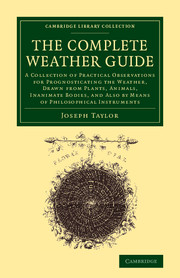
- Cited by 1
-
Cited byCrossref Citations
This Book has been cited by the following publications. This list is generated based on data provided by Crossref.
Rochlitz, Julian 2023. Sensing weather: scientific and experiential modes of knowledge production for small-scale farming in western Kenya. Geographica Helvetica, Vol. 78, Issue. 1, p. 87.
- Publisher:
- Cambridge University Press
- Online publication date:
- October 2014
- Print publication year:
- 2013
- Online ISBN:
- 9781107323841


